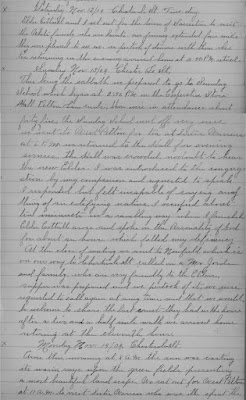Here's his entry from November 17, 1904:
Thursday Nov. 17/04. Chester le St.
Today we went to Grange Villa. Called on Sister Smith. While there stamped some tracts and went to West Pelton to begin tracting. Elder Cottrell told me to start in at West Pelton and he went to Twizell [Lane]. This was my first experience [tracting] and I felt very timid. I didn’t even know what to say when I delivered a tract, but before beginning I uttered silent prayers to my Heavenly Father to aid me in this unaccustomed labor. I believe my prayers were answered because I received courage and begin my labors with fear and encouragement. The first tract I delivered was at the Alma Cottage. Was not received very kindly by the man who came to the door, but I finally persuaded him to accept a tract. The fifth door I went to the lady received me very kindly, invited me in, and I explained our doctrines to her the best I could. When I was leaving, she invited me to return and have another chat with her. Told her I would and left. After going to several more doors I left off tracting having distributed thirty six tracts, sold three books, [and] had three conversations. I returned to the Rail Road crossing to wait on my companion. When he came we went to Newfield. Had tea with Sister Wears and at 7 P.M. went to Mutual at the Store Hall. Had a nice meeting. There were about forty enrolled members. Leaving there, we went to Mr. Jordans for supper, then out to Chester [le St.]. Retired at 11.
Where Willard's companion, Elder Cottrell, was tracting.
Where Willard was tracting.
Original journal entry.








